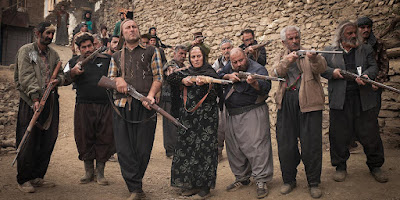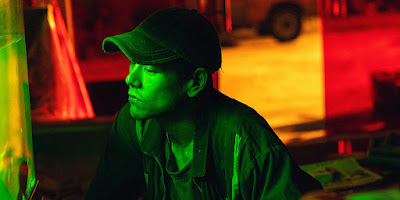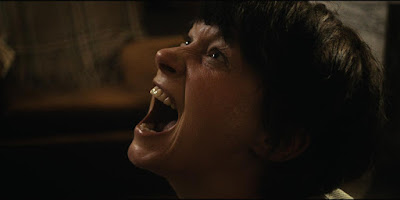This is how topsy-turvy the world is. My final movie at the
2021 Toronto International Film Festival is a Keira Knightley Christmas movie.
One of the great things about attending a film festival, is to walk into a movie
theater or, as is my case this year - stream a movie - you have no idea about. This movie with a premise of a midnight madness movie was a complete surprise. I loved it.
It is Christmas afternoon. Nell (Keira Knightley) and her son Art (Roman Griffin Davis) are in the kitchen preparing dinner. Michael Bublé plays. It is a beautiful afternoon in the English countryside. Perfect. Peaceful. Art is cutting carrots and cuts his finger. Blood spurts all over the carrots.
Family and friends begin to arrive. Some eat the bloody carrot bits. They either do not notice or do not mind. The kids run around the house and get in each other’s hair. This leads to a lot, a hell of a lot of children profanity. It is stupid, fucking funny.
"Tonight is all about love and forgiveness." Nell proclaims to everyone who has assembled for this Christmas celebration. Tonight will indeed be about a lot of things.
Another common thread that I have seen with the movies I have watched this year the Toronto International Film Festival is great dinner sequences. You Are Not My Mother, Saloum, Unclenching The Fists. Silent Night also contains a dinner scene, and it is amazing and the centerpiece of the entire movie.
Dinner is served. There are hints that something far greater is happening outside this family Christmas dinner. The potatoes are rationed. One potato per person. A prayer is begun. It is awkward and funny. Nell contributes to the prayer, “To love we have shared.” The word, “have” hangs in the air. One of the guests Bella (Lucy Punch) looks out the window. Her look of nervousness is at odds of the beautiful blue sky out the window. The conversation turns to the Queen’s speech. "Well she is clearly in some bunker setup", says Tony (Rufus Jones). Nell quips, "If you want to live in a hole and eat dog food..." "It's fine because she's old" Kitty (Davida McKenzie) quips.
The dinner conversation gets even better when Art brings up Greta Thunberg. Roman Griffin Davis and Davida McKenzie play exceptionally well off of one another. Sofie (Lily-Rose Depp) begins to expound upon the difficult night she had last night. The adults are trying to change the conversation but the kids want to hear more. "We had dinner, sang Celine Dion, dance to Brittney, laugh, cried..." Sophie gets out before the subject is changed.
Someone mentions, that they should be honest with the kids. Art insists that his parents have told him the truth. Kitty interjects, "The Russians want us all dead and are sending poisonous gas to kill us all. They are obsessed with world domination." Art, "Do not be ridiculous Kitty it isn't the Russians. The planet has absorbed every ones filthy rubbish, it had enough and it cannot take it anymore so it's spitting it back out as a fuck you to the world."
It is mentioned that the government of the United Kingdom cares for it's people and has provided aid and assistance to the residents of the country that will abate pain and suffering. There is a website Exit.Gov.Co.Uk that provides information on how to Die With Dignity. The government has provided other tools to alleviate the fate that awaits million and millions of people. Art points out that all of this government assistance is not available for everyone in the country and he is adamant that he will not follow along with the government instructions.
Christmas must go on. Games are played. Spirits are imbibed. Presents are wrapped. In another revelation of rationing and a clue to the big story, the presents are wrapped in newsprint. Art holds a present with the headline: New York Governor Declares State Of Emergency. Burrough Of Queens death toll passes two million. As we garner subtle hints of life in this catastrophic world, watching people proceed with a high degree of normalcy we wonder what the fuck is actually happening out in the world. People surly are not playing charades, sipping on champagne.
As the tsunami of toxic gas races towards the English countryside and the moment of mortality approaches the tension and anxiety infuse the movie with such great moments. The pathos of humanity is on full display. I, the audience, sitting relatively safe in the "real world", it is all a delight. Except for the back of your brain reminding you of the ongoing pandemic and the climate change that is getting worse everyday. The entertainment of it all runs parallel to the very real - not too far from now - "real world" scenarios that could very well come to fruition.
Writer and Director Camille Griffin said in her introduction, "I believe as the world becomes more fragile, society becomes more divided between those that do and those that don't give a damn about one another. With Silent Night I wanted to investigate the world of privilege to see what might happen when catastrophe knocks at their door. No amount of money, education, good manners can save anyone from the inevitable. She wrote the script pre-Covid without any knowledge of the pandemic. Covid didn't enter the world until after shooting on the movie began. What has become clear to everyone is it is incredibly hard to protect societies in the world. We need to step up and take care of one another. How far are we prepared to go to protect the ones we love and how far are we prepared to protect the rest of the world."
I love a movie that changes tones like a whiplash. I loved
the many tones contained in this movie. There are so many great performances in this movie, to single one out feels as though to take away from the work this ensemble cast created. That being said, Roman Griffin Davis is absolutely amazing in this film. Camille Griffin's feature film debut will go up with White Christmas and It's A Wonderful Life for ever how many Christmas nights I and the rest of humanity on the planet have left.






































